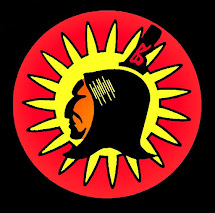So a couple of days after Americans celebrated their Declaration of Independence from tyranny I travelled to Washington D.C. to observe and participate in the U.S. State Department's "Smart Partnership Dialogue" events. The events are to assist the State Department in their review of the U.S. position on the United Nations Declaration on the Rights of Indigenous Peoples, that position being a complete rejection of the entire document back in 2007.

The first day, July 7th, was the "Tribal Consultation", described as the "government-to-government tribal consultations between U.S. government agencies and federally recognized tribes". The State Department, which actually hosted the meeting at their facility, rolled out a few of its big guns for the event (don't get excited, Hillary was no where close) and rustled up some White House Indians, some Interior Department underlings and various other government agency staffers. The event was well attended; in fact the room was full to capacity. Sitting to the immediate left of the U.S. panel was the Haudenosaunee representatives; I single them out specifically because of the events that would unfold later in the week. A good portion of the discussion focused around religious rights, sacred sites, federal recognition and the general poverty of Indian Country. No one mentioned economic development, trade, passports or any issues related to Native sovereignty as it relates to the international community or the United Nations.
The second day was an opportunity for the NGO's to be heard; that's U.N. speak for non government organizations. In other words, the federally recognized tribal leaders had their day, now it was time for the people. This event was held at the Smithsonian's Museum of the Native Americans on the Capitol Mall. I went to listen for the Seneca Free Trade Association but to speak as a free thinking Kanienkehaka. And speak I did.
I began by expressing my cynicism for the whole process, especially with the agency's constant reference to the domestication of indigenous/tribal issues and the foreboding of potential conflicts should our issues no longer be held as domestic issues. I suggested that we take a look at how well we have fared with their domestication of us. I also expressed skepticism on the integrity and conscience of the international community as well. I actually brought up many of their domestic laws and policies including the passport issue as well as their Western Hemisphere Travel Initiative IDs that attempt to force our declaration of U.S. or Canadian citizenship. I brought up the citizenship act of 1924, the Homestead Act, the Dawes Act, income tax, draft registration for military service, BIA recognition, the conflict between state's rights and federal authority, jurisdiction, land loss, land use, land title and land claims. I brought up federal Indian law and the practice of establishing precedence against weaker tribes to apply force of law against others. I brought up trade and commerce as well as the role the United States plays in preventing our private sector development. I spoke of the tobacco trade and couldn't help but mention that tobacco was prominently displayed in full growth as part of the landscaping for the museum (and not traditional Indian tobacco but full broad leaf commercial grade tobacco). I brought up the overtures made by the President and the photo ops and of course the White House Indians. I brought up the PACT Act and called out Jodie Gillette in front of the whole auditorium for not giving us the time of day to discuss the damage that her boss signed into law. What I didn't know was what was about to transpire over the next couple of days.


A few days after the State Department finished courting us in D.C., the Iroquois National lacrosse team was held hostage by them in New York City. Bound for England to play in the World Lacrosse Championship Tournament in Manchester, the Haudenosaunee passport carriers ran into a brick wall. The United Kingdom refused to issue travel visas for the team without assurances from the State Department that the travellers would be allowed back home on their Haudenosaunee passports. In the eleventh hour Hillary Clinton intervened and ordered that the department issue a "one time" waiver to allow the use of the substandard travel documents for reentry into the U.S.. Feeling as if they were off the hook without really giving into the obstinate Indians, the State Department stepped out of the role as villain. The problem was that the Brits weren't satisfied. The U.S. had shoved the hi-tech travel documents down every one's throats in the name of 9-11 and Hillary's discretionary use of "one time" waivers was not cutting it for them, so now they insisted that the athletes either produce U.S. or Canadian passports, in other words fully recognized passports, to receive their visas.
So a little more than a week after Americans celebrated their independence from their tyrant, the very people who lost more in and after the war that was fought for that independence were kicked around like illegal immigrants. The media had a frenzy with the issue but stayed cautiously close to the main story line: Iroquois Nationals banned from competition for insisting on using their own passports. There was never any connection made to the discussion over the U.N. Declaration. The Haudenosaunee representatives never broached the subject in Washington and the entire coverage of the issue as it developed never strayed beyond the lacrosse players. Only I mentioned the travel document issue in this "Smart Partnership Dialogue". If I had any idea these guys were heading to Europe I would have jumped all over the issue rather than just mentioning it.
Our people face travel restrictions every day. With half of our Haudenosaunee communities north of the imaginary line and half south of it, as well as one Mohawk community straddling it, we can't even visit family without a fight over travel documents. Even without their international borders to cross, goods are seized even as we travel from one community to another in the commission of legal trade. As you read this, a prominent Seneca is on trial because his product was purchased by a Native retailer in the state of Washington without reporting the transaction to the state. Two Mohawk boys were permanently disabled when a U.S. Coast Guard vessel rammed their boat as a result of their refusal to yield to them as they travelled across the river from one part of Akwesasne to another. U.S. and Canadian officials blocked bridge access to part of Akwesasne simply because the people refused to allow Canadian Border Service Agents to be armed on Mohawk land. Vehicles that drive from one part of Akwesasne to another that don't first drive into the city of Cornwall to report are seized if they later enter Canada. Invitations to many countries are declined simply because of travel restrictions for those that refuse to declare themselves as U.S. or Canadian citizens and this is the real issue.
Although the mainstream media has danced around the subject, the main conflict over all the travel documents is centered on the insistence that we declare citizenship to a nation that is not our own. This is not just assimilation, it is by definition; genocide. The third act that constitutes genocide according to the Convention on the Prevention and Punishment of the Crime of Genocide is: Deliberately inflicting on the group conditions of life calculated to bring about its physical destruction in whole or in part.
So where does this leave reconsideration of the U.N. Declaration? What is the point of open discussions if there is no transparency to what happens off stage? My skepticism of the international community could not have been more justified when one of the nations(Great Britain), that has already signed, attempts to force our people to declare subjugation to the only two countries(the US and Canada) on the planet that have refused to become signatory nations. Much of the debate about this U.N. document has been over its potential legal ramifications. We know from past experiences that the first time this is used as a legal document against the U.S. someone will challenge it and have the federal courts declare it unconstitutional as a legally binding agreement. Man-made law will not solve our issues; U.S., U.N. nor any other. Fair and honest diplomacy, that can withstand international scrutiny, is the only solution and it is long overdue, I do declare.










